Realizing a DreamA Winter Ascent of the Diamond, D7,
|
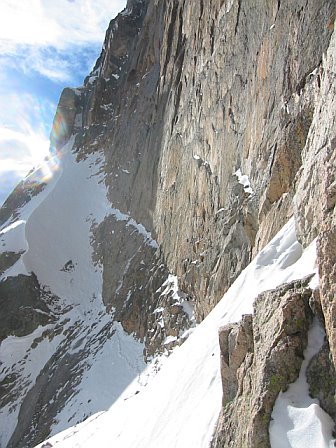
I don’t know how often the Diamond gets climbed in winter, but I don’t think it is a common occurrence, even with all the uber-alpinists that live around here. It was something that I had had on my list for years. I never even attempted it, though, because it was like having Cerro Torre on your list. Frankly, I feared that I just wasn’t tough enough or fast enough to pull this off in a winter day. Actually, I didn’t fear that so much as I knew that I wasn't tough enough. I don’t do particularly well in the cold. I have bad circulation in both my hands and feet. So, it remained on my list and I did nothing about it. Each winter season would come and I’d think “It would be so cool to have a winter ascent of the Diamond on my resume, but actually doing it would be so miserable that I’ll just keep it safely there on my to-do list and not put it on the scheduled list.
At least that was the case until this winter, when I brought up this idea with Phil Gruber and he was game. He had been dreaming of it for ten years. Climbing with Phil is like climbing the Nose with Hans Florine. It’s cheating. World-class alpinst Josh Wharton, a frequent partner of Phil’s, called Phil “the best climber you’ve never heard of.” Phil’s a modest, 60-hour-a-week, IBM family man. Underneath his casual demeanor lurks an incredible athlete. His list of climbing accomplishments are too numerous to list and I’m just referring to the ones I know about.
Phil isn’t one to spray about his feats, but I can’t resist listing a few.
He was the first person (and one of only two including Leo Houlding) to onsight
Half Dome’s Regular Northwest Face. Though “only” 5.12c, this route has spit
off Dean Potter and Yuji Hirayama. I remember Micah Dash calling this route
“Boulder Canyon 5.13” in an American Alpine Club article. Free ascents of
this route are extremely rare. He’s also done Free Rider on  With hardly any
alpine experience, though a strong rock climber and a good ice climber, he
flew to Europe and three days after landing, on his first trip to the
With hardly any
alpine experience, though a strong rock climber and a good ice climber, he
flew to Europe and three days after landing, on his first trip to the
At this point, you’ve got to be wondering why Phil would agree to climb the Diamond with me in winter? Were we good friends? No, not really. We didn’t really know each other very well. Was I a climber of similar ability? Not by the farthest stretch of any imagination. Had we climbed together before and hit it off? No, this would be our first climb together. When I told my wife Sheri the plan, I said, “Phil isn’t the type of guy to fail. Going with him means really doing it. So if I’m going to back out, it needs to be before we set a date.” After agreeing in principle to the idea, we didn’t talk much about it until winter actually arrived. Winter came in like a lion this year and we received storm after storm after storm. Our original idea was to try the Diamond early in winter, before much snow had fallen and made the approach much more grueling. When the snows came early, we changed to as late as possible when the days were longer and warmer.
As March wore on, I wondered if Phil was really serious about climbing with me and that maybe he just said that to be nice at the time. I was thinking about asking a regular partner in the attempt. Since we were such an unlikely team, I didn’t want to put Phil on the spot with a “you said you’d climb it” email. Hence, I was thrilled when a week ago, he pinged me with an email saying:
Hey Bill,
If we want to climb the diamond in "Winter" we better go this weekend. Are you open? I'm out of shape (had a cold for 4 weeks) and haven't aid climbed in years, but I'm still game!
Phil
The weather looked stellar for Sunday with highs in 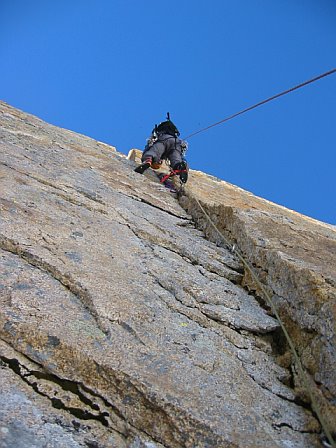
We chose to climb D7 because it had continuous crack systems up the entire route and considered to be the easiest route on the Diamond in winter, when you’d likely have to aid nearly every move. Phil had rope-soloed D7 in the summer, freeing the route twice – while leading and cleaning – for “a good workout.” I’d done D7 once before, on aid of course, as it goes free at 5.11d. The winter speed record was on D7 as well. It is held by Jonny Copp and Josh Wharton 14h17m. Phil joked about us breaking the record and I allowed myself to fantasy about this until well into our climbing day, when reality finally set in.
My alarm went off at 2:15 a.m. on Sunday morning. My car and pack were ready
to go and after a cup of coffee, I drove over to Phil’s house by 3 a.m. We
drove up to Longs Peak Trailhead parking lot. In the summer, if you arrive
at 4 a.m. like we did, you’d find the lot completely full. On this morning
we were a little surprised to see 3 or 4 other cars. I checked the registry
at the trailhead and only one party had signed in (headed for the
The trail was rock solid snow, nearly ice, and slippery. I knew we were in
for a long day and set what I thought was a reasonable pace. It wasn’t. At
least not by Phil’s standards. He went by and led the way, just like he’d
do for the rest of the day. I struggled to keep up, just like I’d do for the
rest of the day. This day was reminiscent of my climbs with Hans Florine in
I noticed in the log that a team had tried to do Kiener’s Route (a route
that ascends just to the south of the Diamond) the day before, but high winds
had turned them back. Once we hit treeline the winds started to hit us as
well and I put on my shell to keep it at bay. Silently I wondered if the winds
would turn us back and if that was a good thing or not. When we got to the
ranger cabin below
My brother in-law Kraig Koski had set me up to climb with him and we climbed
the Serpent in Eldo. I mentioned it to him, but he didn’t remember me. I’d
met him a couple of other times throughout the years and he didn’t remember
either time. He’s a bit of a strange guy and once was enough as far as climbing
with him. One of his partners recognized my name though and asked, “Are you
the speed climber guy?” Ralph then said, “Are you going for speed today? 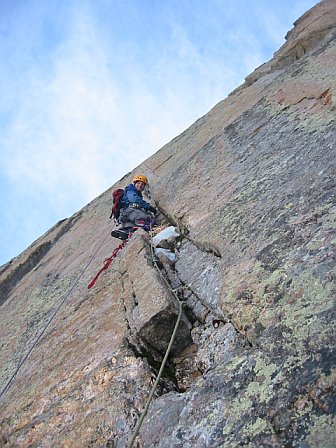 Oh,
I guess not since you’re stopping.” This is the type of things Ralph says.
I don’t know him well enough to attribute this line to complete ignorance
of speed climbing (does he think climbers go 14 hours without stopping to
pee or put on different layers?) or just trying to be annoying. Once he knew
our route intention he said, “Well the North Chimney is the crux.” This from
a guy whose never climbed the Diamond in winter, having failed four times
(he told us) to reach Broadway. Others have said similar comments so it isn’t
outrageous, but 800 feet of vertical rock lies above Broadway and more tiring
climbing above that. Getting to Broadway doesn’t guarantee success and I’d
guess that most parties that get that far still fail. Then Ralph did yet another
strange thing. As his partners headed up towards Kieners, he headed down!
He yelled up something about this gear to his partners, who responded, “What?
I thought you were coming with us?” He wasn’t feeling well and decided to
just hike out, though not being very clear with his climbing partners. Shortly
afterwards Phil and I headed up in the same direction and soon passed these
other two climbers. I doubt they climbed Kieners because I never saw them
climb up Lambs Slide.
Oh,
I guess not since you’re stopping.” This is the type of things Ralph says.
I don’t know him well enough to attribute this line to complete ignorance
of speed climbing (does he think climbers go 14 hours without stopping to
pee or put on different layers?) or just trying to be annoying. Once he knew
our route intention he said, “Well the North Chimney is the crux.” This from
a guy whose never climbed the Diamond in winter, having failed four times
(he told us) to reach Broadway. Others have said similar comments so it isn’t
outrageous, but 800 feet of vertical rock lies above Broadway and more tiring
climbing above that. Getting to Broadway doesn’t guarantee success and I’d
guess that most parties that get that far still fail. Then Ralph did yet another
strange thing. As his partners headed up towards Kieners, he headed down!
He yelled up something about this gear to his partners, who responded, “What?
I thought you were coming with us?” He wasn’t feeling well and decided to
just hike out, though not being very clear with his climbing partners. Shortly
afterwards Phil and I headed up in the same direction and soon passed these
other two climbers. I doubt they climbed Kieners because I never saw them
climb up Lambs Slide.
The one nice aspect of climbing the east face of Longs in winter is that
you don’t have to do the tiring and annoying talus walk around
At the last semi-flat spot we stopped to gear up. Here we strapped on the crampons for the mixed climbing up the North Chimney (a 4-pitch, 5.5 rock climb in the summer) that would lead us to Broadway, the sloping ledge at the base of the Diamond. Phil kicked nice steps up the snowfield to the base of the gully. The North Chimney route is a misnomer; there really isn’t any chimney climbing involved or even a chimney to be found. It is just a weakness in the wall that consists mostly of slab climbing in the summer.
We stuck to snow gullies with short, tricky rock steps, simul-climbing all
the way to the base of the final hard section. Here I belayed Phil as he worked
his way up the nearly vertical wall on the left. The climbing was steep and
complicated, through lots of big blocks with tricky, sparse gear. We had been
cruising along, on pace to reach Broadway in four hours from the trailhead,
but now things moved very slowly as Phil searched for safe passage to the
ledge. I started to get cold standing in the snow in the shaded couloir. Eventually
Phil anchored the rope on Broadway and recommended that I jug instead of climb.
I’m not sure if this was the right decision, mainly because I proceeded to
completely make a complete cluster f*&^ of things while ascending. I first
couldn’t get my cramponed boot into the aiders and then crampons and my axe
would catch on everything and the loop of trailing rope would get stuck and…
It was a complete and utter (any Paul Sherwin bike racing fans out there?)
disaster. Phil made every effort to make things easier on me, but the rope
went directly sideways a couple of times and that made cleaning the gear much
tougher. One time the rope jogged directly sideways to the left and into a
sharp-looking crack. I feared a swing to the left might cut the rope as is
grated across the edge, so I desperately climbed leftwards instead of jugging,
further dorking things up. By the time I arrived on Broadway, I was spent
and so tangled in the rope I could barely move. I wondered what Phil thought
when he looked down and saw me practically strangling myself with rope. It
was our first climb together and I wanted to make a good impression. 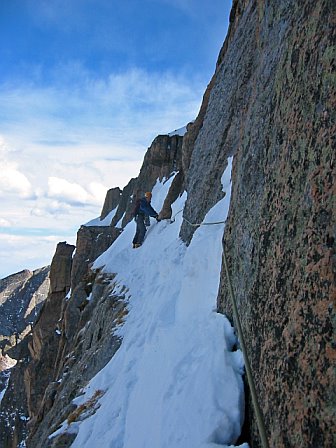
Phil then led across Broadway, which was completely covered in snow. Below this ledge is the Diagonal Wall and it’s a drop of nearly a thousand feet in places. The snow was good, though, and the traverse wasn’t bad until the final rock slab that led directly to the first anchor at the base of D7. After I followed, we switched out of snow/ice mode and into rock climbing mode. This meant stowing both axes and crampons and digging out the aiders for Phil. I carried most of the weight in my pack while Phil led with his mostly empty pack. Phil started up the first pitch and moved steadily. Around 50-60 feet up, Phil short-fixed the rope. This was our strategy to stay warm and keep both of us moving. Ideally, we’d have short-fixed every 100 feet – often enough to keep Phil well supplied with gear, but not so often that he was forced to self-belay too long. In practice Phil usually went longer than one hundred feet, with a couple of exceptions. He wanted to use the existing fixed anchors, to save gear and speed up the building of anchors.
I jugged up the line at a fast pace, knowing that my job was to get to the top of the rope and put Phil on a regular belay as soon as possible. Then he could pull the gear I cleaned on the tag line and he wouldn’t have to bother with the complicated task of self-belaying. This speed-jugging did a great job of warming me up, for by the time I got to jug I was quite cold. In order to be dexterous enough to handle all the gear, knots, and ropes involved with climbing, I wore a light pair of gloves. To avoid freezing my hands, I put chemical heaters into the gloves. I feared they wouldn’t work very well above 13,000 feet, but these kept my hands functional the entire day.
We continued this strategy and inched up the face. Phil would occasional
do a couple of free moves, either out of necessity or because he felt they
were safe. We both had on light alpine boots from Sportiva. In fact, Phil
had just picked up a pair of these directly from Sportiva in
On one of the pitches, a short ways above the belay, Phil encountered an ice blob that completely filled the crack. He wasn’t sure he could get by it and as he pondered the situation I wondered if I’d be sending him up the ice axe so that he could chop the block away. I didn’t much like that idea since this was a substantial piece of ice and I was directly below it. He eventually found a creative placement was able to move by it.
The weather was beautiful for the entire day. I could hear the wind howling
some of the time, but we were mostly shielded from the wind on the Diamond.
While we weren’t in the sun because of the orientation of the face, few clouds
were in the sky. Phil did a great job of continually moving up the face. He
always short-fixed and we were never together once we started up the face.
Phil started up D7 proper around 9:40 a.m. We had about 800 vertical feet
to climb and it took us about six and a half hours. During the entire time
on the wall, I didn’t drink anything. This was dumb, but I didn’t want to
bother with removing my pack to fish out my water bottle. There are no ledges
on this route bigger than six inches, so I was always hanging in my harness,
at least to some extent. By the time I drank on the summit of Longs, it had
been eight hours since my last sip. I was completely bonked. Stupid.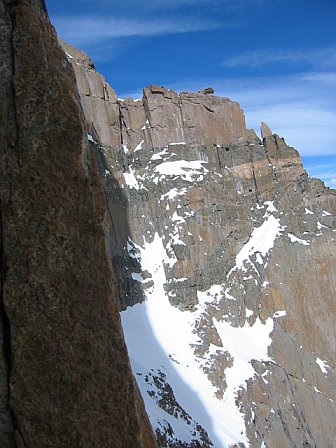
As I jugged the penultimate pitch on D7 to Almost Table Ledge, Phil self-belayed himself up the last twenty feet to Table Ledge. This was some bold climbing, as he had to free climb above his last piece into a completely snow-covered Table Ledge. He called it the scariest lead of the day.
When I arrived on Table Ledge around 4:20 p.m. we took a look at the disconcerting traverse to our left. In the summer, this is just a walk and eventually gets into the 4th class scrambling of Kiener’s Route, but now the ledge was completely covered with steep snow and the prospects of it all avalanching off, us with it, weren’t enticing. Phil briefly contemplated rappelling, but with a single 60-meter rope I didn’t like that option. I wanted off this wall and I knew the easier climbing of upper Kiener’s was only a hundred feet to our left. We strapped on our crampons and pulled out our axes. Phil led out as I stowed the aiders, ascenders, and tag line. Phil found a number of placements for protection and the traverse wasn’t that bad, in retrospect.
Once across the traverse, we stayed roped and Phil led up Kiener’s Route. I was incredibly tired at this point and would have to stop for ten breaths after moving just ten steps. We were simul-climbing and I was dragging along about a hundred feet of slack behind my Gri-Gri belay device. I gradually had to play out this rope because Phil was moving faster than I could go. Eventually, just after the step-around move of Kiener’s Route, I ran out of slack and now Phil was pulling me up the route. The climbing at this point is trivial – 4th class at best and probably 3rd class, even in winter. I didn’t need the rope, but Phil still placed some gear. I stayed tied in until just a few yards from the summit when I was finally close enough to Phil that he could say, “Hey, idiot, untie from the dang rope so that I can coil it.” He didn’t actually say this, but that’s what I’d have been thinking, if I could have thought. My brain wasn’t working so well, along with my body. I could barely move.
We hit the summit of
I immediately downed half of my remaining liter of liquid and started feeling
better. We packed up the gear, touched the summit marker, and started down.
Phil carried more than his share of the weight to try and equalize our speeds
a bit. I knew the way down the north face very well, so I led the way. Not
having to fight gravity did wonders for my energy level and I moved quickly
down this section. A hundred meters before the
After the rappel, we downclimbed steep snow until reaching low-angled terrain. Here we stopped to strip off crampons and harnesses, and to stow our axes. It was all over now except for a couple hours of hiking. We finished off all our remaining liquids and started the trudge back toward the car. At Chasm Cutoff we had to turn on the headlamps and here we stripped off some clothing as well. We lost the trail from here down to Jim’s Grove cutoff, but it didn’t matter much. We found it just above the trail junction and continued down into the trees.
The last hour of hiking was endless. My knees were killing me. I was so sleepy and so tired. I fantasized about hot tubs, beds, French fries, and Gatorade. The most annoying part of this descent was the surprise postholing. Apparently it had warmed enough that in select locations, we’d go from walking on rock-hard snow to plunging a single foot clear down to our knee, bashing our shins in the process and falling painful forward. This happened to both of us five or six times and always unexpectedly.
We hit the end of the trail 16 hours, 46 minutes, 6 seconds after we started.
I was as tired as I’d ever been. The combination of lack of fuel (food and
water) and a brutally long day had taken a heavy toll on me. I was almost
glad to hear that Phil’s thigh was cramping up on him. At least he was semi-human.
I drove his car back to
Even though I only followed behind Phil, this ranks as one of my proudest climbing accomplishments. I think it is on par with climbing the Nose of El Capitan in a day. The key to an audacious venture like this is your partner. In that respect I struck gold, pure gold. We of limited ability must seek out these supermen and convince them to team up. Here I succeeded wildly.
This was my sixth ascent of the Diamond, on my sixth attempt. I know I shouldn’t
acknowledge that. I'm due to be weathered off and now it will be hell to find
a partner. My luck has to run out and who wants to be along when that happens.
I’ve now climbed the
| Location |
Time of Day |
Elapsed Time |
| My Driveway |
2:45 a.m. |
n/a |
| Trailhead |
4:21 a.m. |
0:00:00 |
| Jim’s Grove Junction |
5:22 a.m. |
1:01:46 |
| Chasm Cutoff |
5:44 a.m. |
1:23:20 |
| |
6:57 a.m. |
2:36:09 |
| Base of the East Face |
7:42 a.m. |
3:21:09 |
| Broadway |
9:00 a.m. ? |
4:39:?? |
| Starting up D7 |
9:40 a.m. |
5:20:?? |
| Table Ledge |
4:21 p.m. |
12:00 |
| |
5:50 p.m. |
13:29:00 |
| Boulder Field |
7:00 p.m. |
~14:40 |
| Chasm Cutoff |
7:57 p.m. |
15:33:?? |
| Jim’s Grove Junction |
8:17 p.m. |
15:56:?? |
| Trailhead |
9:07 p.m. |
16:46:06 trailhead-to-trailhead |
| My Driveway |
10:40 p.m. |
n/a – but 20 hours house-to-house |
Figure 1 : Timetable, as best I can figure from an altitude profile and a bunch of spurious split times on my watch.
